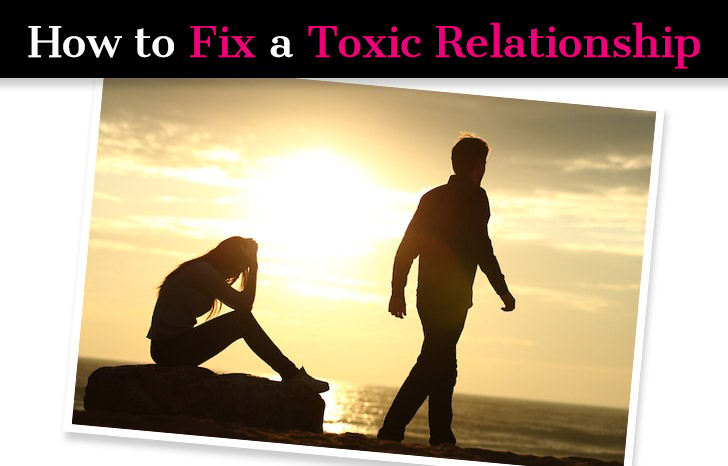Toxic relationships are tricky things because they rarely start out toxic. They usually start out nice and fun and exciting, giving you just enough happy memories to hold onto when the toxicity starts to creep in. It usually starts out slowly, and before you know it, you are stuck in a toxic relationship that you can’t seem to leave even though you feel totally miserable.
In my last Ask a Guy article, I discussed the defining features and signs of a toxic relationship.
Please, before you begin reading this article, make sure that you have read and understood the previous article entirely. In this article I want to go a little deeper into how to repair a toxic relationship, and how to know if it even can be repaired, or if it’s time to walk away.
So what can you do to fix a toxic relationship?
The truth is, you may or may not be able to fix a toxic relationship, but there are certainly steps you can take to try.
In some cases, clear communication and two willing partners can vastly improve the quality of their relationship… sometimes to the point where you’d never know there was ever a problem.
Sometimes the other person is completely unwilling to change, or change anything about how they treat you… at that point, you’ll need to have clear internal boundaries and decide whether or not you want them to be in your life at all (relationships with family members or the parent to your children might be examples of relationships you don’t sever, but approach with extremely clear boundaries in place).
There are a few things you must put in place in order to improve (or even fix) a toxic relationship.
A few quick disclaimers…
First off, I need to make it clear that if you’ve ever been physically hit in your relationship, I urge you to seek out a professional for guidance and support. There is no scenario in which being hit is part of a healthy relationship. I have seen cases where a woman makes an excuse for why it happened or she felt she deserved it or she downplays it as “no big deal.”
So I have to make this very clear, if you have been physically hit in your current relationship, please seek out a professional for guidance and support. If this is you, I hope you really listen to what I just said and do it now.
Next, I want to make clear that I’m a guy who writes my opinion. I need to protect myself legally, so I want to make this quick disclaimer that this article (or any of my articles) should not be interpreted as professional help and should be read for entertainment purposes only. Anything you do (or don’t do) based on reading this article is your responsibility… not mine and not A New Mode’s.
So while I do want the very best for you and while I do my very best to write the most high quality content out there, I needed to just say that quick disclaimer before we delve into how to resolve a toxic relationship…
Also, if you feel like you might be in a toxic relationship, I highly recommend that you take this toxic relationship quiz right now. The link will open the quiz in a new window and you can come back to this article in a bit.)
OK, back to talking about what you can do to flush out the toxicity from your relationship…
Walking Power
First, you need to be willing to walk away.
I’m not telling you to leave the relationship, but rather to find the place in your mind where you could picture leaving the relationship and being completely OK.
I’m not saying you wouldn’t be sad or mourn the end of the relationship… and I’m not saying for you to want to break off your relationship with him…
I’m saying that you can imagine leaving and, on a deeper level than the immediate breakup, you can imagine being 100% OK, whole and accepting that it’s over.
Visualizing this is important because it will help your mind see that you really are OK… even now… and it will quiet the voices in your head that fuel your fear of loss (like we talked about in the previous article about signs you’re in a toxic relationship).
When you’re willing to walk away if the toxic relationship can’t be improved, then you will finally break the cycle of sacrificing your well-being in order to “keep the peace” in the relationship.
Clear Boundaries
Also, you need clarity of your situation and, from there, you need to establish clear boundaries in your mind.
If you’ve been in the habit of avoiding conflict and trying to keep the peace, the idea of forming clear boundaries might sound like I’m going to tell you that you need to rock the boat or “put your foot down” or “put him in this place.”
Don’t worry. Having clear boundaries isn’t about being confrontational or assertive or mean… it is simply about being clear: clear on what you will accept, clear on what you won’t accept, clear in your communication and clear about who is responsible for what.
You can become really clear on your boundaries very quickly. You just need to realize two essential truths:
- You cannot be responsible for someone else’s emotions, reactions or actions
- You are completely responsible for your own actions and emotions. Nobody else can be.
Now, notice I used the word “can” up above and not “should”.
I’m not saying that you “shouldn’t” be responsible for his emotions or that he “shouldn’t” be responsible for yours…
I’m saying that you and he can’t be responsible for each other’s emotions, reactions and actions. It is not possible.
Nobody has control over your emotions.
They can’t create them, they can’t feel them, they can’t address them, they can’t resolve them, they can’t choose to let them go and they can’t choose to be in touch with your inner sense of OK-ness.
They can’t do these things for you, and therefore, it is impossible to expect anyone to be truly responsible for your emotions, reactions and actions.
You are the only one with the experience of your emotions and you are the only one who can have control over your emotions.
Emotional Responsibility
So to build on this idea into something you can use to hopefully improve your relationship, I want to introduce a concept I call emotional responsibility.
Emotional responsibility is essentially what people are pointing to when they talk about things like “healthy boundaries” or “emotional maturity” or “healthy attachment strategies.” The core of all those positive relationship attributes requires that you have emotional responsibility, which simply acknowledges that you cannot take responsibility for another person’s emotions, actions, and reactions and you can’t hold them responsible for your emotions, actions, and reactions.
Again, to hammer the point home, I’m not saying you shouldn’t. I’m saying you can’t. To believe otherwise is a very destructive error (a very common error to the point of almost being considered “normal” to believe, but an error nonetheless).
You are not a victim
You might be in a situation that you don’t want, but you still have control.
I want to make it clear that I’m not saying the situation is your fault or that you deserve what he’s doing or that the situation is somehow “fair” or “not a big deal.”
What I’m saying is that you are not helpless… you have control and with that control you have the power to massively improve the relationship (or, in a worst case scenario, see that no improvement is possible and walk away with the full knowledge that there’s nothing else you could have done).
You always have control because you are the only one who can control your emotions, actions, and reactions. No matter what, nobody can take that away from you.
It’s very important that you acknowledge this side of the relationship dynamic because looking at things from a perspective where another person is responsible for your emotions, reactions, or actions is a key ingredient in the toxic relationship. In order to dissolve the toxic dynamic in a relationship, you must fully realize this truth.
In the words of Eleanor Roosevelt, “No one can make you feel inferior without your consent.” Her quote points to the immense power that comes with taking complete responsibility for your emotions, reactions and actions and not blaming anything or anyone else for them.
Similarly, they are not the authority on your emotions. You know what you are thinking, feeling and saying. You know what your intentions are and why you are doing or saying what you choose to do or say. They cannot know this, they are not responsible for this and any accusation they might make about your intentions has no basis in reality (and therefore, requires no reaction on your part).
In the same way, you can’t be responsible for their emotions, reactions, and actions.
You are not their savior or caregiver.
You might love them and want the best for them, but they are the only one who can control their emotions, reactions and actions. You cannot control these things for them, and therefore, it is impossible to live as if you are at all responsible for their emotions, actions and reactions.
Letting go of the illusion that you are somehow responsible for their emotions, reactions, and actions might at first feel like you are cutting them off, being emotionally cold, giving up on them, not caring or being cruel.
It might feel like that, but the fact remains that you cannot be responsible for their emotions, reactions, or actions.
No matter how much you care about them. No matter how much you stress over them. No matter how deeply you love them. No matter how much you want them to be happy.
It doesn’t matter how strongly you feel about them or your relationship… nothing will change the absolute fact that you cannot and will never have control over their emotions, reactions, or actions. You need to let go of that idea entirely because it is a huge piece of what keeps a toxic relationship in place.
We’ll talk about what a healthy and effective form of caring looks like in a moment.
Drama entrenches conflict, non-reaction dissolves conflict…
It’s essential that you understand that you are responsible for your own emotions, reactions, and actions (and you are not responsible for his at all) because it sets the stage to dissolve your conflict with him.
Just because you’re not responsible for his reactions doesn’t mean that entitles you to intentionally provoke negative emotions in your partner, nor is it a smart idea.
The wisest and most effective strategy to communicate with your partner is to always have the best intentions for you, for him, and for your relationship.
This is the healthy form of caring for another person… that is, to always intend to do what’s best for you, him and your relationship.
When you know your intentions are for the good of everyone involved, you can take action clearly and confidently and if they have a negative reaction towards you, you can let them own it themselves without taking on any of the negativity yourself since you know that your intentions are always coming from a good, pure, positive place.
Taking responsibility for his negative emotions, reactions, or actions is not good for the relationship (same goes for trying to resolve his negative emotions for him, as if you’re somehow responsible for them or could ultimately resolve his emotions for him.)
Not taking responsibility for your own emotions (or putting your negative emotions on him and expecting him to somehow resolve them) is also not good for the relationship.
Making each other into an enemy is definitely not good for the relationship…
He may not immediately adopt that way of communicating with you if he’s been heavily in the habit of making you into an enemy, blaming you, criticizing you, putting you down, etc. In fact, he may never adopt that way of communicating with you, at which point you may decide to limit your exposure to him or break off the relationship completely.
Regardless of what he does, you do not and cannot have any control of him. You, however, will do best to always communicate with him with your, his and your relationship’s best interests in mind since you want to be effective at dissolving the conflict in your relationship and you can only control your actions, not his.
You want to improve things and only you can control you, so in order to start improving things, you’ll need to be the one to take new, bold, decisive action to improve things. You’ve already tried everything else and it hasn’t improved on its own. If you want things to improve now, then it’s up to you to get the ball rolling.
The reason you want to make sure your actions are in your, his, and your relationship’s best interest is because approaching communication from that angle will bring in your sense of clarity and compassion.
Instead of reacting to things he’s saying and doing with emotions and drama, you can look at things from a higher level.
You can ask yourself: is reacting negatively to what he’s saying or doing right now good for me, him or the relationship? No? Then I will choose not to react.
His negative actions are the spark of conflict, but your emotionally negative reactions are the fuel which catches fire and propels the toxic relationship into full swing.
If you take away the fuel (your negative emotional reactions), you stop the momentum of the toxic relationship dead in its tracks.
Now at this point I will be the first to admit that this is not easy. Speaking personally, it took me years of meditation to improve in this area and, while I’m much better in this area now than I ever was, I still have plenty of room for improvement.
So I acknowledge that this takes inner work to not react (especially when someone is hitting your triggers and, moreover, when it might feel like that doing everything they can to draw you into conflict…)
So yes, I recognize that this is not easy (and not common in our society either, unfortunately).
And no, I am not expecting you to be some kind of emotionless robot… there is a practical and realistic way that you can have this important communication skill in the real world.
Understanding the logic of this is one thing, putting it into practice is another. You might ask…
How can I stop my negative emotional reactions to him and his behavior?
In our society, women get some really bad social identities projected onto them, which simply aren’t true.
Society subtly spreads a poisonous message to women that they are victims who have no control over their emotions.
This simply isn’t the case. Moreover, it’s not about needing to “control” your emotions (as if your emotions are exploding inside of you and you’re trying with all your might to push them down). It’s about having clarity so that instead of interpreting things in a scary, negative way (which results in feeling an overwhelming surge of negative emotions), you interpret things in a clear and empowering way, so that no negative emotions come up in the first place and you’re OK, calm and at peace.
This is not possible if you hold a viewpoint that you are somehow a victim in any way (by victim I am talking about someone who makes someone or something else responsible for their emotions, reactions and actions).
The key point is this: it is your interpretation of the event and not the event itself that causes the majority of your suffering.
Change the way you see things and you’ll change the way you interpret things. Change the way you interpret things and you’ll be able to massively reduce or even remove the suffering in your relationships.
Clarity and non-reaction is your approach…
At this point, you’re clear on your boundaries (he’s entirely responsible for his feelings, you’re entirely responsible for yours) and we’ve discussed how feeding into conflict with him only strengthens the toxicity of the relationship.
Now we’re going to talk about action steps to resolve a toxic relationship… or see clearly that it is not able to be saved.
Action steps to resolve a toxic relationship
I’m going to give you a clear way to approach resolving this through communication and you will either be able to set the stage for resolving the toxicity in your relationship and improve your relationship over time… or, in the worst case, you’ll walk away and you’ll be able to do so with clarity and wholeness (versus having a bunch of unresolved feelings).
As discussed before, you need to be OK with walking away before you can have this conversation with him. If you have not found that place in your mind where you can imagine breaking up with this person and still being able to be completely OK, whole and at peace with it… then get there internally first.
Next, you need to stop engaging in the drama. You aren’t going to resolve this through conflict, so there is no value in continuing to feed into any drama or conflict (whether it’s indulging in sulking through your own negative emotions about your relationship with them or through directly fighting with them).
You’re ready to proceed once that foundation is in place.
You will do this as many times as necessary… or you will determine at some point that you are at an impasse with them…
How to talk to your partner to dissolve the toxic relationship:
When things are calm, talk about the relationship and make it very short and to the point. You can start the conversation by saying:
“You’re important to me and I want you in my life. There are some things in this relationship that are deal-breakers for me. My hope is that we can work them out and the only way that could happen is if I tell you clearly what they are.”
Then explain instances where he is making you responsible for his actions or emotions (by guilting, by blaming, by accusing, etc.)… or taking away your responsibility for your own emotions/actions (by labeling what you’re doing/feeling, by making decisions for you, etc.)
Dealing with his reactions
After you initiate this conversation, he may launch even harder into his guilting, blaming or accusing (or his labeling of what you’re actually feeling or doing).
If this happens, you can just point it out that you can’t be responsible for his emotions (it’s not possible), he can’t know what you’re feeling or your intentions (nobody is a mind reader) and while you want the best for him, for yourself, and for your relationship, you can’t be responsible to make them see and feel that.
Also, he may point out where you are doing these things… in these cases where you really are making him responsible for your emotions (or reactions or actions), you will calmly listen and take responsibility. You can say, “You’re right. I need to take responsibility for my emotions and my actions if this relationship is going to work. I take responsibility for that.”
Again, you need to approach the conversation having already resolved that you can walk away and you’ll be OK. This way, if he threatens that he’ll end the relationship because you’re “making” him feel upset, you won’t be upset by the threat, but instead see it for what it is (him not taking responsibility for his emotions and reactions).
As a result, you won’t react negatively to his negative behavior and you’ll stop feeding the toxic dynamic… and there’s nothing more shocking to a person than when their partner stops feeding into a toxic dynamic.
It might be a calm conversation or it might get ugly. What determines if there can be improvement is if, at the end of the conversation, you have an agreement that you are both willing to each take responsibility for your own actions and emotions and not put that on the other person.
There will be no more “shoulding” in the relationship (that is, holding an expectation over the other person’s head that they “should” be doing something… and if they don’t, they deserve to be punished and are entitled to punish you for it).
This applies to both of you… in order for this to work, the relationship cannot be approached from a victim/victimizer perspective. Instead, it must be approached from the perspective of what’s best for everyone involved, with clear and complete personal emotional responsibility in both people.
Where to go from here…
The most important piece of the puzzle in resolving a toxic relationship is getting really clear internally: clear on what you are and aren’t responsible for, clear on what behavior is healthy and acceptable from him and clear on what is healthy behavior from you.
Getting this clarity is not about what one person should be doing or what you deserve. Getting this clarity is about seeing clearly whether or not this relationship will work for you and be a healthy part of your life (or, on the other side, if it will not be able to work for you and not be a healthy part of your life).
This isn’t about anyone being right or wrong, nor is it about someone being a “good” or “bad” person. This is simply about the relationship dynamic: can it work or not?
By being clear on your boundaries (seeing that you are 100% responsible for your actions, reactions and emotions… and he for his), you can easily see whether or not the relationship dynamic is healthy or not.
And if it’s not, you can clearly see what needs to be brought on track. It’s as simple as recognizing when one of you is making the other one responsible for your (or his) emotions, reactions and actions… which creates an impossible and relationship-destroying dynamic when left unaddressed.
By reaching a place where you can be OK even if the relationship ends, you are prepared to address the unhealthy dynamic in your relationship without your fear of loss betraying what’s best for you, for him and for the relationship.
And finally, by clearly speaking to him about addressing the toxic dynamic directly, you have clearly given him the opportunity to choose how he’d like to proceed.
He might choose not to change, in which case you might choose to end the relationship (or drastically limit your exposure to him if completely leaving is not possible).
He might fight you hard at first, but without your negative reaction to his habitual communication to you, he might begin to change when he realizes you really will leave if things don’t change.
Or… he might be surprisingly understanding and receptive to what you tell him and be willing to work with you on improving the relationship together. That’s the best case scenario, and remember, you really are in this together.
If you do decide to stay in the relationship and he is willing to consciously work on how he communicates with you, make sure you remember that you’re on the same side and you’re right there with him (not standing back waiting, judging, and watching with your arms crossed).
I mention this because too often I see articles about toxic relationships putting the blame 100% on the other person, which doesn’t serve you since it’s always important to be conscious of your what you’re putting out there as well. It serves you to always have this awareness.
Relationships happen in real time, moment to moment. They are not “things”, like a rock or a car or a bed. They are an ongoing, living, breathing dance with another person and you choose to dance with them every single day you have this relationship with them.
Always remember that you choose them every day… and you have the power to stop choosing your current relationship dynamic if it no longer works in your life.
Good luck in your relationship, I wish you the very best.
Hope it helps,
eric charles














